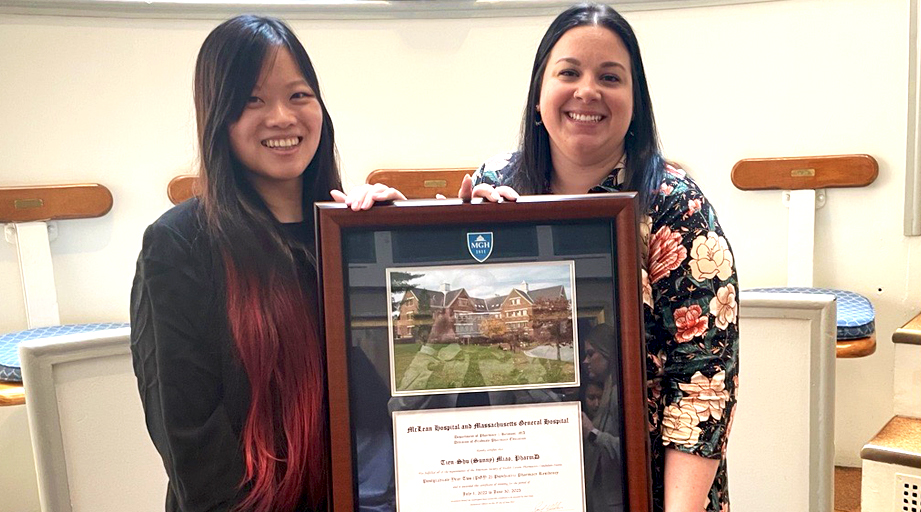
Nearly a decade ago, two new hires at McLean Hospital had a vision for growing the clinical pharmacy program at the psychiatric hospital.
First Victoria Vargas and Carol Aboud launched a nationwide search for clinical psychiatric pharmacists, eventually hiring nearly a dozen of them. Then the pair set a new goal: Training the next generation of pharmacists specializing in mental health.
Today, the postgraduate year 2 residency (PGY2) program in psychiatry at McLean/Massachusetts General Hospital, is in its second year. The program started out with one resident, and last year added a second, thanks in part to a $25,000 Residency Expansion grant, sponsored by Merck, from the ASHP Foundation.
“What better location to have a PGY2 program in psychiatric pharmacy then a freestanding psychiatric hospital that’s ranked best in this country and that has a dozen specialized psychiatric pharmacists?” said Vargas, now the director of pharmacy.
The foundation’s expansion grant marks a growing focus on attracting more pharmacists to the mental health workforce, which has been overwhelmed by crushing demands, most significantly since the COVID-19 pandemic.
The 2023 ASHP/ASHP Foundation Pharmacy Forecast predicted an increased need for pharmacists with advanced training in mental health and substance use disorders to help fill that gap. The newly released 2024 forecast noted that pharmacists across all practice settings are positioned to play a critical role in responding to the crisis, most notably when it comes to treating opioid use disorder.
“There’s a huge need for the services that we’re offering, and we wanted to grow,” said Aboud, now the chief pharmacy officer.
“We were pleased to award this grant,” said Barbara Nussbaum, the foundation’s vice president for research and education. “The foundation’s expansion grants support a priority for ASHP, enabling more opportunities in advanced training of pharmacists to deliver optimal patient care. We know the patient need is great, and McLean’s program is an important investment in building a healthy population.”
Residency programs are a pre-requisite for board certification in psychiatry. The U.S. has roughly 80 psychiatric residency pharmacy programs, according to ASHP.
Lauren Stummer, the residency program director at McLean, said the PGY2 program required a different approach than that of other psychiatric residency programs, which are more typically based in general hospitals or Veterans Administration facilities.
“Ours is unique, so we were coming up with some new ideas,” she said.
McLean’s PGY2 program offers specialized learning experiences based on the patients’ ages and diagnosis. Each unit is tailored to a specific patient population, such as depressive disorders, psychotic disorders, substance use disorders, and geriatrics.
“This allows PGY2 residents to gain experience within specific domains of psychiatry to ultimately improve the lives of their patients,” said Stummer.
Sunny Miao was the program’s first PGY2 resident. After completing the program last year, she stayed on and is now working in McLean’s adolescent and psychotic disorder units. Even though the McLean program was brand-new, she had been eager to earn the single available spot after completing her postgraduate year 1 residency in inpatient care.
“I was able to rotate in units that were disease specific, which was one of the main reasons I decided to come to this program,” said Miao, who is in the process of earning board certification. “I got to dive really deep into each specific diagnosis and see how patients are treated with different medications, different combinations of psychopharmacology.”
Stummer noted that most pharmacy schools spend little time on pharmacists’ role in treating mental health disorders. But she pointed out that the healthcare workforce continues to face huge demands, citing substance use disorders as well as dementia-related cases among the aging Baby Boomer population.
“There are a lot of different areas where psychiatric pharmacy is going to be growing,” said Stummer.








